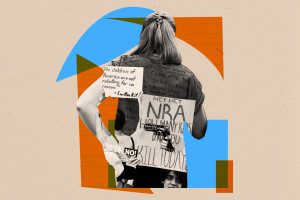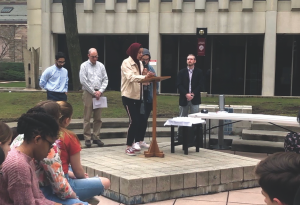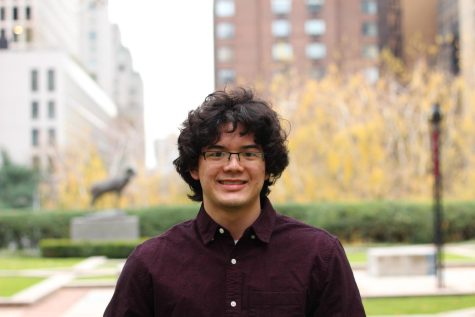Michigan State’s Misinformation Nightmare
The mass shooting in East Lansing revealed egregious flaws in social media and American culture
BRANISLAV ONDRASIK VIA WIKIMEDIA COMMONS
There was confusion and panic at Michigan State University when misinformation spread online amid an active shooter situation on campus.
March 5, 2023
On the night of Feb. 13, I was getting ready for bed when one of my best friends, who lives on campus at Michigan State University (MSU), sent me a text saying, “I am safe, locked down, and hiding right now.” I had not yet seen the news of the school shooter who wounded five people on the MSU campus in East Lansing and killed three others. Suddenly, I was wide awake, scrolling through Twitter feeds and news updates for the next three hours, frantically searching for any information that would tell me that my friend was unharmed, the shooter was caught and it would all be okay.
My friend is safe, and the gunman was never even close to the building they live in, but at the time, no one — not me, not my friend, not even MSU police — knew that. The shooter could have been anywhere, and tracking him down was no easy task: MSU has one of the largest campuses in the country, spanning over 5,200 acres. But the internet is even bigger, and navigating the flurry of misinformation and false reports made the situation worse for everyone involved.
The shooter was a Black man in his 40s, wearing a jean jacket and red shoes and carrying a handgun, but a New York Times analysis of police audio from the incident revealed reports that it was a person in a burgundy sweater, or a green one, or a white man carrying an AR-style rifle, or a trio of gunmen. At one point, the officers even responded to a reported shooting in an athletic center that never actually happened.
It’s bad enough that police and civilians struggled to pin down the perpetrator. But the deluge of false reports on Twitter only made the situation more stressful for those under lockdown and for those on the outside trying to ensure the campus’ safety.
In the messy combination of amateur detectives and cookie crumb reporting on social media, the truth can get lost in a sea of plausible misinformation. If something sounds like it could be true, the internet hordes seize it in an attempt to make sense out of a senseless situation. For over an hour, I saw countless tweets reporting that “Lynn Dee Walker” was the suspected gunman and reposting photos of a white man with a mustache and goatee, with a vape in his mouth and his middle finger up. However, Walker was not a real person, and the photos were actually of internet streamer Logo Daedalus, who was not involved in the crime. Many of the tweets accusing Walker of the shooting have since been deleted.
The falsification of Daedalus’ image was the most heinous, but there were other false reports spreading online. A photo of three people carrying large rifles circulated for a while, stoking fears that there were multiple shooters. Twitter users caught wind of police scanners allegedly indicating that there were potentially explosives being unloaded at a building close to my friend’s dorm. There were not.
Instead of a centralized voice assessing the situation and providing accurate information, we have thousands of individuals reposting the latest rumors from their feeds — a result of the lack of oversight of information dissemination on Twitter.
We now know that the shooter fired shots on the north end of campus around 8:15 p.m. then left campus. Once confronted by law enforcement several hours later in East Lansing, he shot and killed himself. Not knowing what was happening at the time was terrifying, and the high volume of misinformation being tossed around online didn’t help.
I can’t blame concerned Twitter users for reposting information they believed was important and accurate, but I can criticize the forces that led us here. The shooting showed Twitter at its worst, an incoherent flurry of fabricated to-the-second updates and political talking points drowning out any real news about what was actually happening. When my best friend’s life is in danger, I don’t want to hear about how liberals won’t accept conservatives’ thoughts and prayers or that MSU is a gun-free zone, so gun control obviously doesn’t work.
That Twitterstorm is the result of two and a half decades of growing internet connectivity and social desensitization in America. In 1999, a response like this to the shooting at Columbine High School was unfathomable. The country trusted law enforcement to deliver the facts and provide a reason for an unimaginable crime. But now, we feel as though we must be purveyors of the truth, and Twitter has democratized information sharing to make this possible. Instead of a centralized voice assessing the situation and providing accurate information, we have thousands of individuals reposting the latest rumors from their feeds — a result of the lack of oversight of information dissemination on Twitter.
Hundreds of accounts reposted viral false reports or political talking points, stoking unwarranted fear and turning an unfolding violent event into a political debate.
Social media can be a valuable means of spreading information. For instance, the killing of George Floyd was live streamed on Facebook Live, reigniting the American consciousness of police brutality. However, it is important to be thoughtful about what you are posting, especially when you’re playing journalist in such a terrifying situation. Without the typical oversight and corroboration that comes with institutionalized news sharing, we must become our own editors and fact checkers.
Most of the people posting about the shooting were not ensuring that they were being considerate of the situation or sharing accurate information. Hundreds of accounts reposted viral false reports or political talking points, stoking unwarranted fear and turning an unfolding violent event into a political debate. Users’ need to boost their online egos overruled their better judgment and made a bad situation worse. This unfortunate result was a reflection of clout-chasing social media culture, but it was also due in large part to the cultural desensitization we’ve developed toward mass shootings.
I understand that asking lawmakers to do something about gun violence will yield nothing, because as long as the National Rifle Association and gun manufacturing lobbyists are in enough Congress members’ pockets, guns will have free reign in America. And while I believe that militarization anywhere is a threat to humanity everywhere, I understand that in our current iteration of society, where the wealthy thrive off of heavily armed military and pseudo-military government groups, there will not be a disarmament.
Instead, I ask those of us with sensibilities not clouded by legalized bribery and extortion to wield our greatest weapon — our voice — wisely. Social media is an incredibly powerful tool, and it can be tempting to echo trending reports and make shallow political pleas to feel like we’re contributing something. But before we hit post, we should ask ourselves if what we’re saying is bringing meaningful thought into the public discourse or if we’re just shouting hollow words into the void.















Wendie Karpinski • Mar 5, 2023 at 1:32 pm
MSU gunman, Anthony McRae, shot himself in LANSING, near the intersection of Lake Lansing Road and North Larch Street — not in East Lansing.